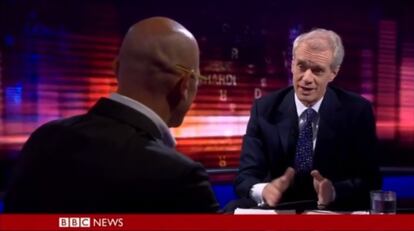Catalonia’s top secessionist candidate gets pummeling in BBC interview
Video showing ‘worst’ moments of Raül Romeva’s ‘Hardtalk’ interview goes viral

On September 9 the BBC’s Hardtalk program interviewed Raül Romeva, the top candidate to the Catalan premiership for the secessionist bloc Junts pel Sí (Together for Yes).
But it wasn’t until a week later that it went viral on Spanish social media after parts of it were uploaded to a YouTube channel run by Dolça Catalunya, a website that compiles anti-secession information.
The video, which weaves together eight different moments from the interview, has been viewed around 675,000 times since then. And a search for “BBC Romeva” on Topsy, a social media analysis website, shows 6,500 tweets in the last week.
The edited version of the BBC interview.
In the clips from the program, which specializes in tough, occasionally controversial interviews, the Catalan secessionist candidate is seen admitting that he is Spanish, seems unsure of the name of his party, and laughs at corruption allegations within Catalonia’s ruling party, premier Artur Mas’s CDC. Host Stephen Sackur, a former BBC correspondent in Washington and Brussels, has no problem interrupting Romeva to say things such as “that’s nonsense” or to tell Romeva to drop the “political jargon.”

However, it is worth pointing out that the Dolça Catalunya version only offers excerpts, and occasionally creates deliberately false impressions. (The full interview can be seen here.) For instance, at one point in the video Romeva appears to admit that he is breaking the law by casting the upcoming regional elections as a de facto referendum on independence:
“We tried for years to do a referendum,” he tells Sackur.
“But that is illegal,” responds the host.
“Exactly. And that is the main problem.”
about verne
“Well you’ve got to accept the law – unless you’re an anarchist.”
But the exchange in the full interview in fact runs like this:
“We tried for years to do a referendum, which means we wanted to know democratically what the people think about the issue, which is an important one.”
“Sure and the Madrid courts also decided, along with the government in Madrid, that that is illegal.”
“Exactly. And that is the main problem.”
“Well you’ve got to accept the law – unless you’re an anarchist.”
A short time later, he also seems to stumble when he says that “a huge majority of people” in Catalonia are in favor of independence, before correcting himself. The full exchange, however, comes across as rather less damning:

“Well, no I’m not, but anyway in Europe we have two principles that are at an equal level, which is the rule of law and democracy. And when laws are not fulfilling the rights and needs of the people and there is a huge majority of people – I don’t know if it’s a majority yet – we will know – but it’s a huge amount of people demonstrating on the streets year after year.”
The complete interview – with Spanish subtitles – is available in the following video for those who want to make their minds up.
What’s more, this is not the first video that Dolça Catalunya has turned into a viral hit: this other one, in which Catalan premier Artur Mas answers questions from a CNN reporter a few months before the November 2014 informal referendum on independence, was viewed over two million times.
Tu suscripción se está usando en otro dispositivo
¿Quieres añadir otro usuario a tu suscripción?
Si continúas leyendo en este dispositivo, no se podrá leer en el otro.
FlechaTu suscripción se está usando en otro dispositivo y solo puedes acceder a EL PAÍS desde un dispositivo a la vez.
Si quieres compartir tu cuenta, cambia tu suscripción a la modalidad Premium, así podrás añadir otro usuario. Cada uno accederá con su propia cuenta de email, lo que os permitirá personalizar vuestra experiencia en EL PAÍS.
En el caso de no saber quién está usando tu cuenta, te recomendamos cambiar tu contraseña aquí.
Si decides continuar compartiendo tu cuenta, este mensaje se mostrará en tu dispositivo y en el de la otra persona que está usando tu cuenta de forma indefinida, afectando a tu experiencia de lectura. Puedes consultar aquí los términos y condiciones de la suscripción digital.









































